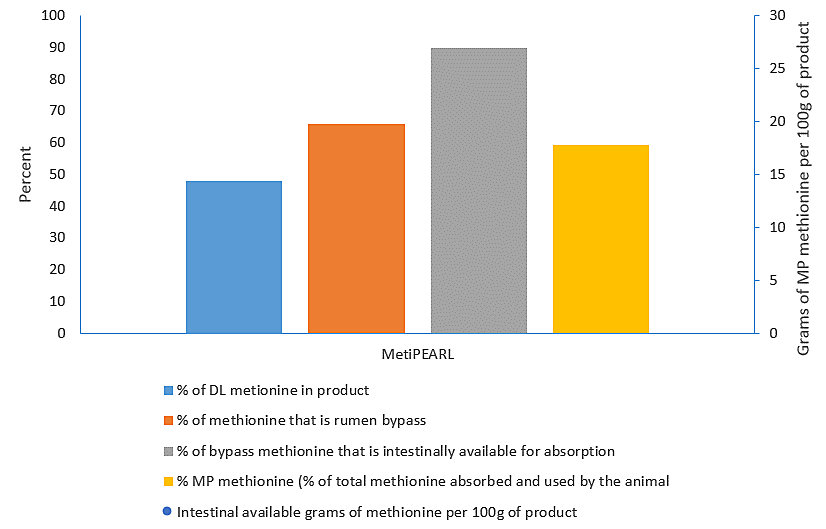Functions of Methionine
Methionine is an essential amino acid, and it is one of the two amino acids that are often limiting in dairy cows’ diets.
Amino acids are building blocks for milk and tissue proteins, hence supplementing the diet of dairy cows with MetiPEARL™ can positively impact milk production and overall performance of ruminant animals.
Methionine also has metabolic roles in helping to maintain the health of dairy cows, especially during the transition period when cows are challenged. In the liver, methionine enhances the metabolism of fat minimizes the risk of fatty liver and ketosis. Methionine also helps to minimize inflammatory processes and reduce oxidative stress through its metabolic synthesis of glutathione, a natural antioxidant. Supplementing the diet of transition dairy cows with MetiPEARL™ will help to meet the elevated requirement of methionine for the synthesis of proteins, production of hormones and other molecules that have a positive impact on the immune system, and for milk production during lactation.
Balancing Amino Acids in Dairy Cow Diet
The levels of methionine and lysine in common feedstuffs are usually lower than that found in the milk of dairy cows. Therefore, a typical dairy cow diet may not supply metabolizable lysine and methionine in the amount and/or ratio that is generally accepted to be optimum (3 parts lysine to 1 part of methionine). MetiPEARL™ provides a cost-effective, flexible and practical option to adequately balance dairy cows’ diet with optimum level of methionine to improve milk production and overall performance of dairy cows.
Bioavailability of Rumen-protected Methionine
Not all protected amino acids products are the same. It is important that a protected amino acid delivers the required amount of the nutrient to the right place, so that it is available for absorption and utilization by the cow.
High rumen bypass alone does not deliver an adequate amount of available methionine to the cow. A high rumen by-pass and poor small intestinal digestibility will deliver only small amount of metabolizable amino acid, which may not meet the requirement of the cow. Figure 1 shows the bioavailability of DL-methionine in a known quantity of MetiPEARL™. Therefore, to effectively evaluate rumen protected methionine products available on the market, Kemin recommends examining the following product characteristics:
- Methionine concentration = Percent (by weight) of the product that is methionine.
- Rumen bypass = Percent of the methionine contained in the product that is undegraded in the rumen.
- Intestinal availability = Percent of undegraded methionine that is available for absorption in the intestine of the animal.
- Metabolizable methionine (MP methionine, %) = Percent of the total methionine contained in the product that is available for absorption and utilization by the animal.
= (concentration of methionine x bypass % x intestinal availability %) / (concentration of methionine)
- Lastly, it is important to determine the cost per unit of MP methionine in the product.


